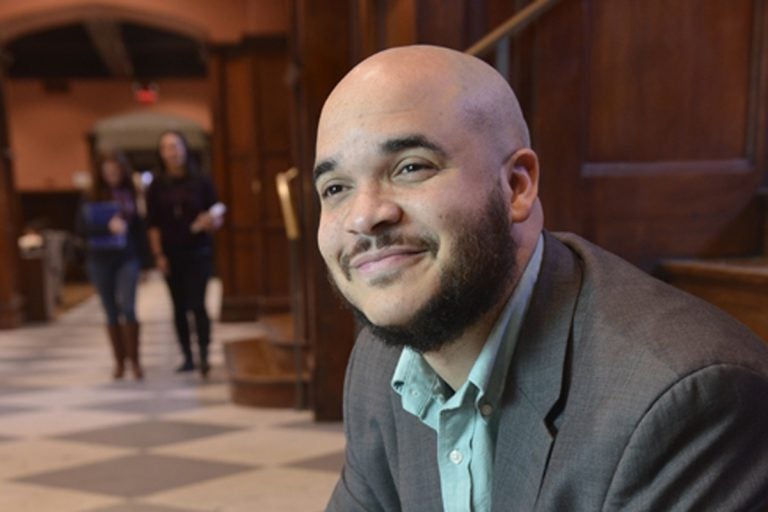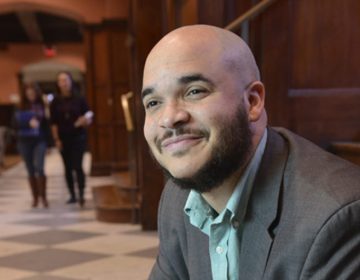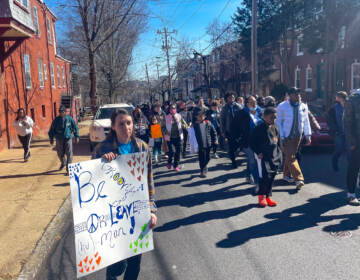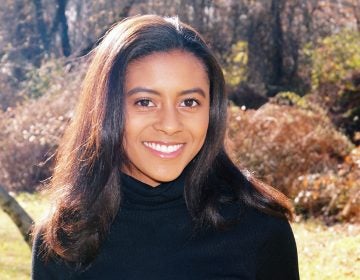Continuing King’s fight, with love in the age of hate
This year, we as a nation should not celebrate King Day. It’s not that Dr. King does not deserve this national holiday. It is America that does not deserve to celebrate him.

Charles Howard is shown in Houston Hall at the University of Pennsylvania in Philadelphia. (Courtesy of University of Pennsylvania)
In observation of the 50th anniversary of the assassination of Dr. Martin Luther King Jr., NewCORE, WHYY, and Philadelphia Media Network are presenting a public discussion, “Does Dr. King’s Life, Legacy, and Hope for America Matter?” on Jan. 15. The event is free, but registration is required. WHYY is publishing a series of essays by panelists Leslie Callahan, Charles Howard, and Maya Hairston.
—
If there ever was a year that we as a nation should not celebrate King Day, it is this year.
And yet, if there ever was a time when we need to learn from and truly commemorate Dr. Martin Luther King Jr. with not only community service, but a serious consideration of his life, that time is now.
It’s not that I think Dr. King does not deserve to have this national holiday. It’s quite the opposite. It is America that does not deserve to celebrate Dr. King.
The “giant triplets” that he spent so much of his life preaching about and fighting against — militarism, materialism, and racism — still stand tall in this nation, perhaps taller than ever.
Nuclear threats made via social media; tax breaks for wealthy individuals and corporations (with no breaks for the poor); hateful, fearful policies against Mexican and Muslim neighbors; ongoing drone warfare; gutting health care opportunities; racist marches in Charlottesville, Virginia, and elsewhere — our bitterly divided country is veering from the direction King dreamed of and fought for.
America should keep King’s name out of its mouth.
And yet my faith, and most of our world religions, remind us that one need not be a perfect adherent to be a follower of a tradition. My walk following Christ is far from perfect, yet I try. And, by grace, I’m still allowed to wear a cross around my neck. I hope to keep engaging with my faith to get closer to the model put forth by the one I follow.
Perhaps it is the same with America and King. At our worst, we are so far from what King dreamed of. Yet, we have, no doubt, made profound steps toward his vision of The Beloved Community. (I — a black man — write this while sitting with my Italian-American wife and our three biracial daughters). Just because we’re not yet what King hoped for doesn’t mean we don’t keep trying.
An essential step for us, if we are to celebrate this day with integrity, will be to not only provide community service with our hands, but to also serve with our minds and hearts by re-examining King’s words and taking them seriously.
It’s easy for me to cynically rant about who is worthy and permitted to celebrate King. I feel good and somewhat vindicated when I throw King’s words at a cruel and fearful White House or my trollish interlocutors on social media. It’s very clear to me what King would think of President Trump and the current Republican Party (and many within the Democratic Party, while we’re at it).
What is more difficult is pausing and allowing myself to be moved by King’s words and witness. With the approach of this year’s King Day, I’ve tried to do that, and one sermon of his has convinced me in a new and profound way.
Loving your enemies
His “I Have a Dream” speech is referenced most often. Many will have heard and felt his “Mountaintop” speech delivered the night before he was killed. A few will have dared to listen to his anti-war/pro-social justice “Riverside” speech, given one year to the day before he died. All of these have moved me and have been formative in my vocational and personal journey.
But the sermon that weighs on me now more than all of these is from 1957. At Dexter Avenue Baptist Church in the Montgomery, Alabama, of George Wallace and Bull Connor, King delivered a sermon titled “Loving Your Enemies.”
Much is lost in summary, therefore I implore you to read it for yourself. He explains how hating those who hate you adds to the darkness in the universe. Even while we believe we are on the right side of a debate or fight, we can be just as hateful as those on the other side.
He articulates how hating those who hate us can warp and distort our souls. Anyone who has held onto unforgiveness knows how damaging and torturous this can be for their own heart.
He ends by saying that, when we show love to those who hate us (or who are spewing hatred into the world), we might turn their hearts. This was crucial to the nonviolent resistance of the civil rights movement. In the face of biting dogs, water hoses, pounding fists, degrading discrimination and racial slurs, demonstrators restrained their own hands. They spoke out against injustice, they marched, they fought, but they did not strike back, and they did not hate. They loved, and it changed many a heart.
It is hard to not respond to hate with hate, particularly when the hater is cruel and difficult to like. I have found myself at the edge of the cliff of hatred several times over the last couple of years. I hate bigotry. It’s hard for me not to hate bigots (especially when their bigotry hurts people I love). But my near hatred for them proves King right. It adds to the cycle of hatred, and it affects my own soul.
King presents a beautiful challenge: Don’t stop fighting against hatred. Never stop. Yet as we fight, fight with love in our hearts. Love, he and all the great world-changing prophets knew, is the greatest of all weapons.
Fighting with love
I sat recently with an older relative with whom I was asked to “never talk politics” for fear that our beliefs would clash and result in a broken relationship and family tension. I told him of this request by other family members, and we both laughed a little.
He said that I should always feel free to speak with him about anything. I then told him “your politics suck.” Because they do. We debated and started to get into it. My pent up near-hatred started to come out as I said, “How could you support him? You of all people should know better.”
We went back and forth until he said something that I’ll never forget.
“Regardless of what we believe and who we vote for, don’t you know that I would die for you? You are family to me, and I love you. You are far more important to me than politics.” And he repeated, “I would die for you. I love you.”
He pulled me back from the cliff. He benevolently messed me up. He fought with love. His politics are still terrible, and I still think he should know better, but amid our differences, he helped to build The Beloved Community. I’ll still fight many of the things he and his candidates of choice are working for, but I want to do so without hating.
A deeper fire
A part of my vocation is something called the Daily Office, a series of prayers made throughout the day. During one of those prayer times, I pray for the president. I pray for my enemies, whoever they may be. I do this every day.
It can be psychically painful to pray for, love, and bless those who are oppressing you. But this is just what King and thousands of known and unknown civil rights demonstrators did. Their love was a fierce love. A love that was stronger than fear, stronger than death and the threat of death. A love that burned with a righteous anger at injustice and burned with a tireless desire for change. A love that came from a deeper fire than the fires that burned crosses then or white supremacist torches now.
Thus my prayer posture has become the same as my protest posture: arms raised with one hand forming a fist and the other forming an open palm of blessing. This is how I believe King would stand today. I pray we may join him and celebrate his legacy this King Day properly: fighting, but fighting with love.
—
NewCORE and its partners are presenting 80 days of conversation events throughout Philadelphia, from Jan. 14, in remembrance of King’s birth, through April 4, in remembrance of his death. Join the official kickoff discussion, “Does Dr. King’s Life, Legacy, and Hope for America Matter?” on Jan. 15 at Philadelphia Media Network, 801 Market St., Philadelphia. The event is free, but registration is required.
The Rev. Charles L. Howard, Ph.D., is the university chaplain at the University of Pennsylvania. His most recent book, “Pond River Ocean Rain,” is a collection of essays about going deeper with God.
WHYY is your source for fact-based, in-depth journalism and information. As a nonprofit organization, we rely on financial support from readers like you. Please give today.





